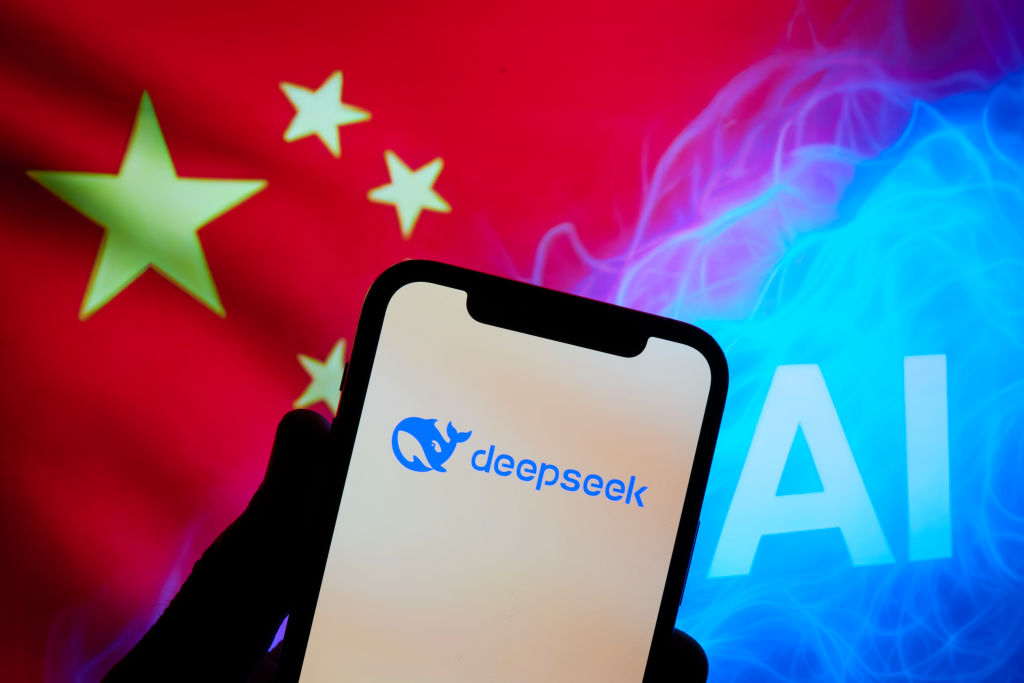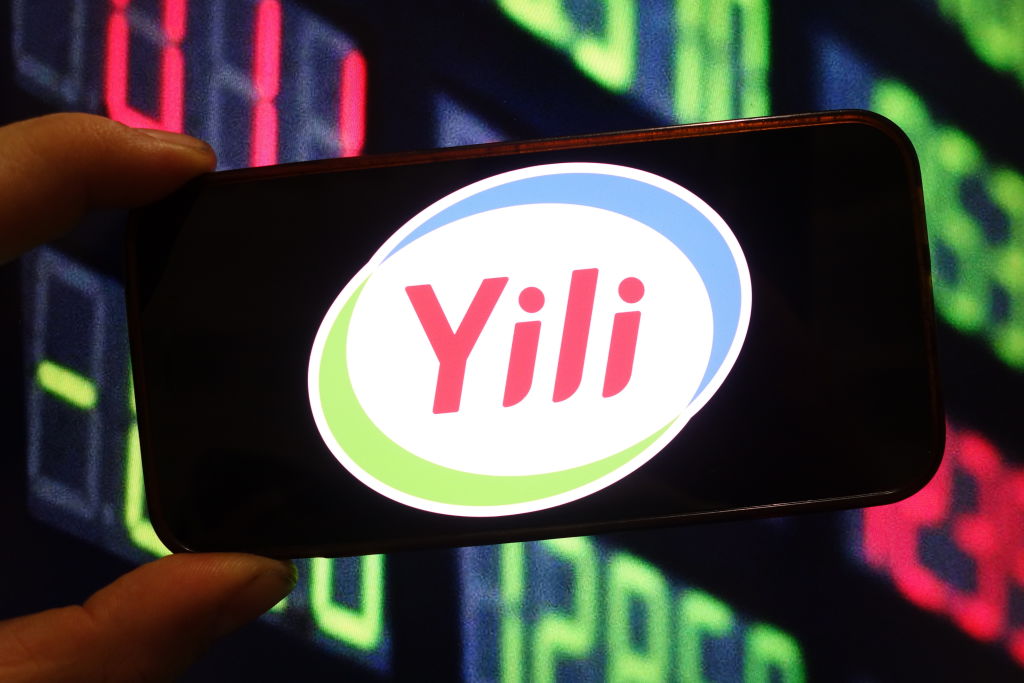Could DeepSeek boost China tech stocks?
DeepSeek appears to have been and gone as far as the stock market’s reaction is concerned, but Chinese tech companies are eagerly embracing advances in AI


Get the latest financial news, insights and expert analysis from our award-winning MoneyWeek team, to help you understand what really matters when it comes to your finances.
You are now subscribed
Your newsletter sign-up was successful
Want to add more newsletters?

Twice daily
MoneyWeek
Get the latest financial news, insights and expert analysis from our award-winning MoneyWeek team, to help you understand what really matters when it comes to your finances.

Four times a week
Look After My Bills
Sign up to our free money-saving newsletter, filled with the latest news and expert advice to help you find the best tips and deals for managing your bills. Start saving today!
For a brief moment in January, Chinese tech start-up DeepSeek looked like it had re-written the global rulebook on artificial intelligence (AI) and the stock market.
The established narrative is that the US dominates technology. Lists of the most popular stocks for retail investors frequently include Magnificent Seven giants like Nvidia and Tesla.
But on 27 January, Nvidia’s market cap fell by almost $600 billion – its largest ever single-day decline – as Chinese AI start-up DeepSeek sent shockwaves through the global stock market.
MoneyWeek
Subscribe to MoneyWeek today and get your first six magazine issues absolutely FREE

Sign up to Money Morning
Don't miss the latest investment and personal finances news, market analysis, plus money-saving tips with our free twice-daily newsletter
Don't miss the latest investment and personal finances news, market analysis, plus money-saving tips with our free twice-daily newsletter
Its flagship chatbot, DeepSeek-R1, could reportedly outperform most Western models, like ChatGPT, despite costing just $6 million to train (a fraction of the $100 million-plus that ChatGPT reportedly costs) and without relying on Nvidia’s most cutting-edge chips. That seemingly took the foundations out from Nvidia’s entire investment case.
Within a month, though, Nvidia’s stock had recovered most of the ground it initially lost, and while its share price declined towards April’s Liberation Day tariff announcement, it has since gone on to reach new heights, becoming the world’s first $4 trillion company in the process.
You could be forgiven for thinking that DeepSeek was just a flash in the pan given how quickly the US stock market has moved on from it.
But DeepSeek’s adoption in China has carried on apace, and the company could offer fresh tailwinds for the country’s much-maligned technology stocks.
What happened to the DeepSeek effect?
There were numerous reasons why the markets seemed to shrug off the initial explosive impact of DeepSeek’s arrival on the AI scene.
“People started questioning the viability and the reliability of the information that we had received over that weekend back in January,” says Bola Onifade, portfolio manager at JP Morgan-owned Nutmeg.
DeepSeek appears to have ‘distilled’ its model from OpenAI, the company behind ChatGPT. The process of distillation essentially replicates much of the performance of a large AI model in a smaller model, reducing its own costs, but not the total costs required to produce a model from scratch. In other words, Nvidia was still getting paid.
Reports also emerged that DeepSeek may not have been totally honest about its non-reliance on Nvidia chips. Officially, it wasn’t allowed access to the most advanced versions thanks to US export controls on strategically critical tech to China. The US commerce department started investigating claims that DeepSeek had managed to acquire controlled Nvidia chips before January was through; in February, Reuters reported that officials in Singapore had charged three men with fraud for allegedly procuring advanced Nvidia chips for DeepSeek.
It appears, even, that DeepSeek is heavily reliant on Nvidia’s technology. On 14 August, the FT reported that the launch of the company’s latest model, R2, had been delayed by DeepSeek’s attempt to train it using Huawei’s Ascend processor, China’s homegrown alternative to Nvidia’s chips.
The Jevons paradox: why DeepSeek boosted AI expectations
The main reason the market moved on from DeepSeek’s initial impact is that it realised that DeepSeek’s claims, even if true, were a bullish sign for the AI market, not a threat.
“There is definitely a positive angle for AI,” says Onifade. The faster, cheaper AI promised by DeepSeek enables faster adoption by companies further on in AI’s value chain, such as software companies or other industries.
“That’s a good story,” says Onifade. “There was a bit of scepticism, and then a bit of ‘actually, this might be good news for the entire AI complex.’”
This is a phenomenon that economists call the Jevons paradox, which contends that more efficient use (and therefore pricing) of a resource leads to greater consumption of it. Microsoft’s CEO Satya Nadella referred to it directly on X (formerly Twitter), stating that “As AI gets more efficient and accessible, we will see its use skyrocket, turning it into a commodity we just can't get enough of” while sharing a link to the paradox’s Wikipedia page.
Jevons paradox strikes again! As AI gets more efficient and accessible, we will see its use skyrocket, turning it into a commodity we just can't get enough of. https://t.co/omEcOPhdIzJanuary 27, 2025
DeepSeek’s impact in China
DeepSeek hasn’t directly made good on this promise in the US as of yet, largely because its usage has been limited over security concerns. That isn’t to say that plenty of Western companies aren’t busy learning about how AI can be built on the cheap.
But in China, it has been adopted at pace in both the public and the private sectors. Goldman Sachs predicted in February that AI adoption would start to boost Chinese productivity from next year, and deliver a 20- to 30-basis point boost to GDP by 2030.
“Big tech companies like Alibaba (NYSE:BABA) and Baidu (NASDAQ:BIDU), they’ve rolled out and integrated [DeepSeek],” says Onifade.
These companies, she says, are “in some ways farther along the integration journey".
“If you believe in the productivity gains that will be brought about by AI, I think you have to believe that companies that are at the forefront of adopting the technology will experience those gains, and deliver it in returns to investors," she adds.
All this is leading to rapid technological acceleration in the country.
“China tech is quickly ramping up its technology and not sitting on a treadmill,” said Dan Ives, head of global technology research at Wedbush Securities. “Tech stalwarts Huawei, Alibaba, Baidu, Tencent (HK:0700), Xiaomi (HK:1810) and others are aggressively looking to accelerate its AI technology ambitions.”
Should you invest in Chinese tech stocks?
Investing in Chinese tech stocks is in many respects akin to entering a completely different ecosystem from that to which Western investors have grown accustomed.
China is the only world region where Amazon, Microsoft and Google are not the top three cloud vendors. In China, those spots go to Alibaba, Tencent and China Telecom (HK:0728), with Huawei taking fourth spot, according to data from Synergy Research Group.
One of the advantages of buying Chinese tech companies is that they are relatively undervalued compared to their US counterparts.
While Magnificent Seven stocks mostly trade at multiples of 30 times projected earnings or higher, Alibaba currently has a forward P/E ratio of 14.2, and Baidu’s is just 12.
However, the rationale for this undervaluation is that investing in Chinese stocks carries risks.
“You’re dealing with a very heavyweight government,” says Onidafe. That has its advantages – for example, the massive amount of resource the Chinese government is putting behind initiatives like ‘Eastern Data and Western Computing’, which seeks to build a huge data centre network in the west of the country.
But it can, and has, played out badly for Chinese tech stocks. The ‘tech crackdown’ that followed the government’s blocking of Ant Group’s IPO in 2020 is a poignant case in point.
“Investors have sticky memories – they recall these events,” says Onifade.
But at the current moment, she adds, the government is supportive of its tech industry. “This is a positive time to look at China again and think about what portfolio allocation should be over the coming years, with the embrace of some of the tech names in China.”
How to invest in Chinese tech stocks
Buying into China’s tech ecosystem is not as straightforward as investing in US big tech, as China is slightly more closed to international investors. Some Chinese tech companies, like Baidu and Alibaba, have American Depository Shares (ADS) listed on US stock exchanges like the NASDAQ – these can be bought and sold in the same way as US tech stocks, though you will need to check exchange rates when assessing companies’ fundamentals.
Others, such as Tencent and Xiaomi, are available as Pink OTC stocks which are often viewed as riskier, given the lower regulatory requirements for companies to list. Alternatively, if your provider allows you to, you may be able to buy these companies’ Hong Kong-listed shares.
An easier route to invest in Chinese tech stocks could be to invest in funds that offer exposure. At a basic level, this could be via an index fund like MSCI China, which as of 31 July has an 8.4% weighting towards the IT sector – not including companies like Tencent or Alibaba, its two top constituents which account for a combined 27% of the index and are classified as consumer services and consumer discretionary, respectively.
Investors seeking a more targeted approach could select a fund like Fidelity International’s China Innovation Fund, which targets Chinese tech companies offering growth and quality at reasonable valuations. Top ten holdings as of 31 July include Tencent, Alibaba and Xiaomi.
Get the latest financial news, insights and expert analysis from our award-winning MoneyWeek team, to help you understand what really matters when it comes to your finances.

Dan is a financial journalist who, prior to joining MoneyWeek, spent five years writing for OPTO, an investment magazine focused on growth and technology stocks, ETFs and thematic investing.
Before becoming a writer, Dan spent six years working in talent acquisition in the tech sector, including for credit scoring start-up ClearScore where he first developed an interest in personal finance.
Dan studied Social Anthropology and Management at Sidney Sussex College and the Judge Business School, Cambridge University. Outside finance, he also enjoys travel writing, and has edited two published travel books.
-
 Should you buy an active ETF?
Should you buy an active ETF?ETFs are often mischaracterised as passive products, but they can be a convenient way to add active management to your portfolio
-
 Power up your pension before 5 April – easy ways to save before the tax year end
Power up your pension before 5 April – easy ways to save before the tax year endWith the end of the tax year looming, pension savers currently have a window to review and maximise what’s going into their retirement funds – we look at how
-
 Three key winners from the AI boom and beyond
Three key winners from the AI boom and beyondJames Harries of the Trojan Global Income Fund picks three promising stocks that transcend the hype of the AI boom
-
 'AI is the real deal – it will change our world in more ways than we can imagine'
'AI is the real deal – it will change our world in more ways than we can imagine'Interview Rob Arnott of Research Affiliates talks to Andrew Van Sickle about the AI bubble, the impact of tariffs on inflation and the outlook for gold and China
-
 Three promising emerging-market stocks to diversify your portfolio
Three promising emerging-market stocks to diversify your portfolioOpinion Omar Negyal, portfolio manager, JPMorgan Global Emerging Markets Income Trust, highlights three emerging-market stocks where he’d put his money
-
 New year, same market forecasts
New year, same market forecastsForecasts from banks and brokers are as bullish as ever this year, but there is less conviction about the US, says Cris Sholto Heaton
-
 How to profit from the UK leisure sector in 2026
How to profit from the UK leisure sector in 2026The UK leisure sector had a straitened few years but now have cash in the bank and are ready to splurge. The sector is best placed to profit
-
 Metals and AI power emerging markets
Metals and AI power emerging marketsThis year’s big emerging market winners have tended to offer exposure to one of 2025’s two winning trends – AI-focused tech and the global metals rally
-
 Quality emerging market companies with consistent returns
Quality emerging market companies with consistent returnsOpinion Mark Hammonds, portfolio manager at Guinness Global Investors, selects three emerging market stocks where he'd put his money
-
 Coreweave is on borrowed time
Coreweave is on borrowed timeAI infrastructure firm Coreweave is heading for trouble and is absurdly pricey, says Matthew Partridge